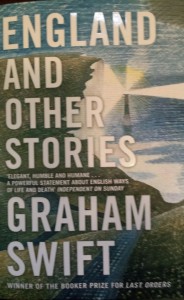I have always enjoyed reading short stories. I know that many people prefer to read a novel, wanting a longer, supposedly ‘meatier’ read and, I confess, I like a long, dense read too. I always feel somewhat bereft when I finish a thick book, or worse, a series of thick books. Yet there is a precision in writing short stories which I admire and a sense of nothing wasted or additional, which I like. In part, that’s why I write them ( and I hope to make another short story available to Readers Club members over Christmas, so sign up, if you haven’t already ). This week I review two contemporary short story collections by English writers.
 The first is ‘England and Other Stories’ by Graham Swift.
The first is ‘England and Other Stories’ by Graham Swift.
This is a relatively new collection ( published 2015 by Scribner ). Swift is a past master at capturing an individual, their thoughts and feelings at a certain point in their lives, in a few perfect brush strokes. He does this again and again in this collection of short stories. The folk within them are a disparate group, of different ages, types and class, living, or passing through, different places in England. Each story illuminates the society which we call English. Contemporary tales, with one exception, their settings vary – urban and rural, pastoral and coastal, but it is in the thoughts and, especially, the speech of these ‘ordinary’ people that we build a picture of where they come from and where they now belong. Together they form a sort of record of what England is today.
The prose is uncluttered, the speech demotic. The people are instantly recognisable, but they and their stories can still surprise. There are snapshots of a chance meeting, or a chance conversation, as well as stories covering a period of time, as a relationship develops, is remembered, or ends. I have my favourite stories and my favourite characters, but, I suspect, these may change when I re-read the collection in a few years time. A compassionate and intelligent portrait of contemporary England. Incidentally, regular readers of this blog might notice that the image used on the cover is from Beachy Head (1939) by Eric Ravilious.
 The second is ‘Pulse‘ by Julian Barnes ( Vintage, 2011 ).
The second is ‘Pulse‘ by Julian Barnes ( Vintage, 2011 ).
I have re-read this collection a number of times since it was published and I gain different insights each time I do so. The tales are attuned to the rhythms and flows of the body, their subject matter is that which defines us as human – life and death, love and loneliness, sex and friendship, lies and truth. Some of the stories are gut-wrenchingly sad, some have a bitter-sweetness, especially where memory is involved and some are amusing, shot through with a sly wit. I have found myself recalling these tales months after reading them.
Many of the stories are immediate – snapshots of conversations at a recurring dinner party engagement at Phil and Joanna’s, or two old friends and colleagues revisiting arguments which they have had many times before as they travel together. I recognised the quick-fire, cross-table, slightly drunken talk in the former, perfectly rendered. The latter was funny and poignant. Sometimes a protagonist is not always the most self-aware individual. Often the reader knows more than they do. Three stories, all in the second part of the book, are written in the first person. Two ( and a half ) are set in the past, again, in the second section.
I will read these again in future. In part because I expect to find more in them than last time and, in part, because they represent the act of being human – ‘the pulse of the heart, the pulse of the blood’ – as one character says. And because they are exquisitely written, not a word wasted, but creating rhythms running through passages and the mind, like the blood runs through the body.
If you enjoyed reading this review and want to read more try Novels Historical


 RSS – Posts
RSS – Posts